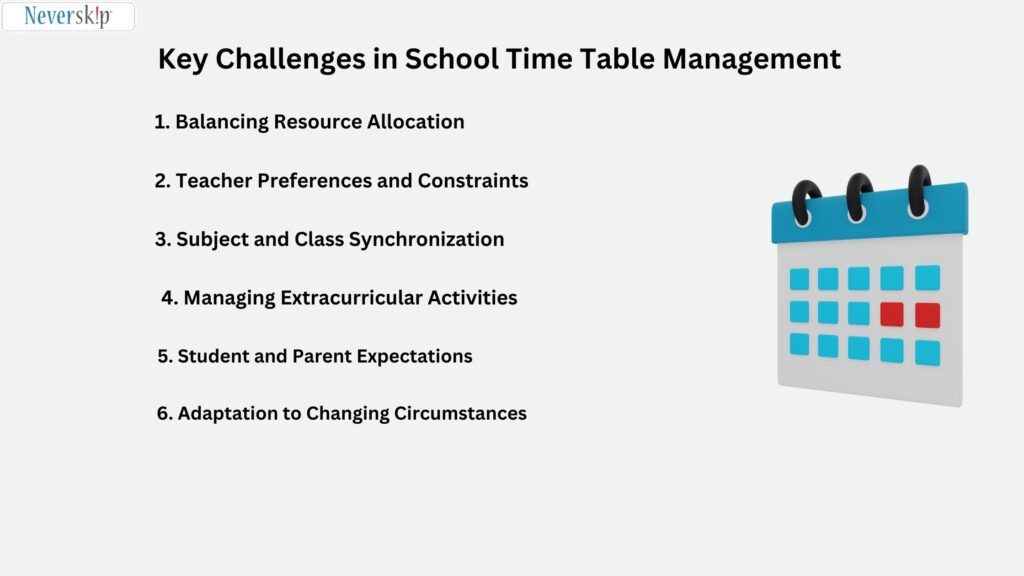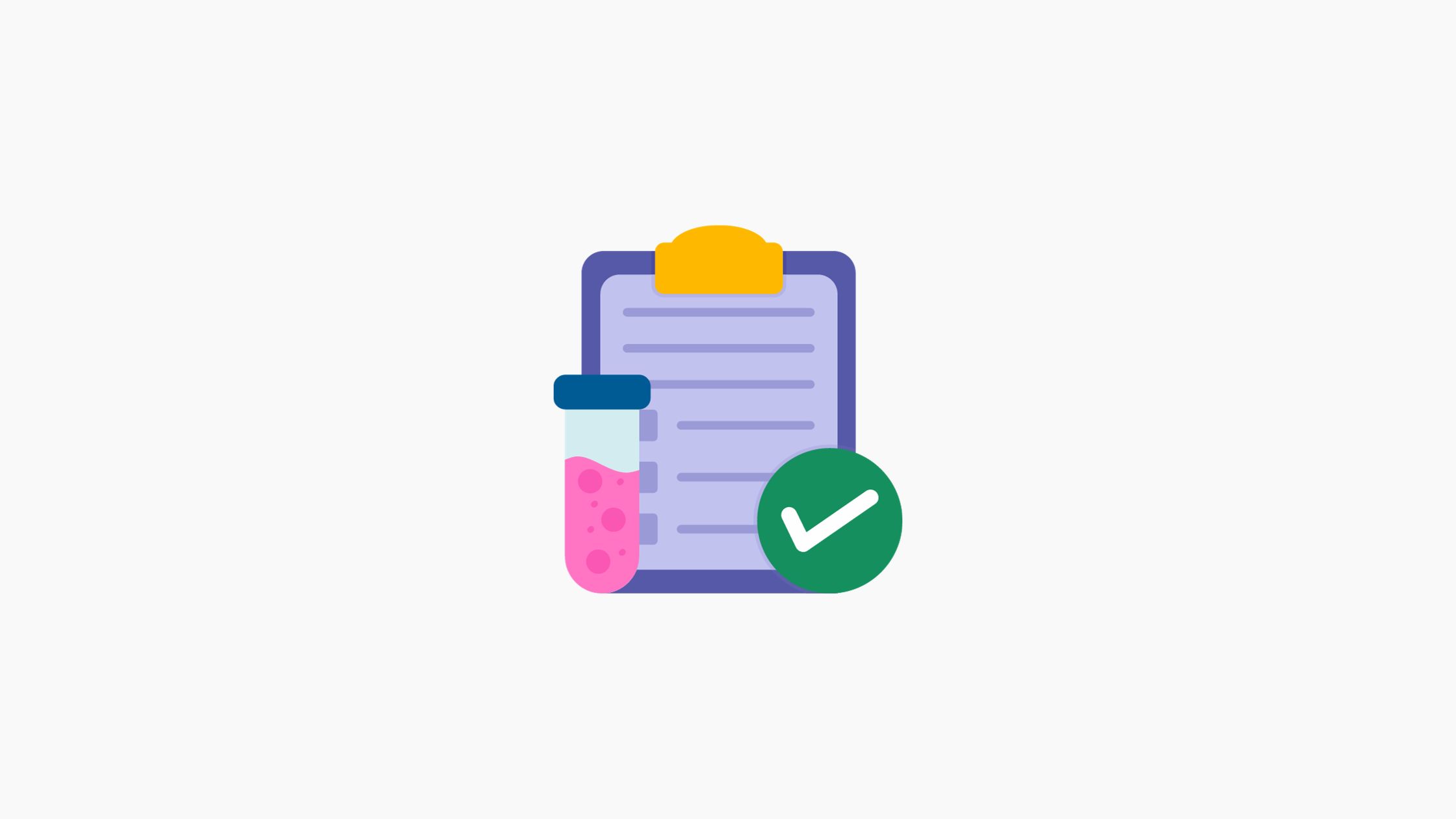In the fast-growing landscape of educational institutions, the art of crafting efficient and effective school timetables is nothing short of a daily juggling act. School principals and administrators are all too familiar with the myriad of complexities that accompany this task.
From optimizing classroom utilization to accommodating diverse subjects, extracurricular activities, and teacher preferences, the challenges in school timetable management are multifaceted and require a delicate balance.
Acknowledging these challenges is not merely a matter of operational concern; it is the cornerstone of fostering an environment where teaching and learning can thrive seamlessly. In this blog, we will delve into the key challenges that confront school leaders in timetable management, emphasizing the pivotal role of understanding these hurdles in order to surmount them effectively.
Key Challenges in School Time Table Management

Creating and maintaining a school timetable is a complex undertaking that demands meticulous attention to detail and a deep understanding of the unique needs and constraints of educational institutions.
School principals and administrators face a multitude of challenges in this process, which can have a significant impact on the overall functioning of a school. In this section, we will discuss the key challenges in school timetable management, aiming to shed light on the intricacies and nuances that school leaders must navigate.
1. Balancing Resource Allocation
One of the fundamental challenges in school timetable management is the allocation of limited resources, such as classrooms, teachers, and specialized facilities. The task becomes even more complicated in schools with a high student-to-teacher ratio or when dealing with resource constraints.
Ensuring that each subject or class receives an appropriate amount of time and space without overloading teachers or facilities is a delicate balancing act.
2. Teacher Preferences and Constraints
Teachers bring their own set of preferences, constraints, and expertise to the table. Some may excel in specific subjects or teaching methods, while others may require specific accommodations due to health or other considerations.
Creating a timetable that accommodates these individual preferences and constraints while maintaining overall balance can be a significant challenge.
3. Subject and Class Synchronization
Aligning subjects and classes to optimize learning experiences can be a formidable task. Schools must consider factors such as subject prerequisites, teacher availability, and the need for uninterrupted teaching blocks.
Ensuring that students have access to the right courses at the right times is crucial for their academic progression.
4. Managing Extracurricular Activities
Extracurricular activities, including sports, clubs, and events, add an additional layer of complexity to timetabling. These activities often involve students and staff members who may have conflicting schedules.
Coordinating extracurriculars with academic commitments requires careful planning to avoid overburdening students or staff.
5. Student and Parent Expectations
Students and parents often have specific expectations regarding class schedules and teacher assignments. These expectations can be influenced by past experiences or personal preferences.
Meeting these expectations while adhering to educational standards and best practices can be challenging, as it may require trade-offs or compromises.
6. Adaptation to Changing Circumstances
The educational landscape is constantly evolving, with new curriculum requirements, student needs, and technology advancements. Schools must be prepared to adapt their timetables to accommodate these changes.
Flexibility and the ability to quickly respond to unexpected events, such as teacher absences or emergencies, are critical aspects of effective timetable management.
In order to navigate these challenges successfully, school administrators must have a thorough understanding of the specific needs and constraints of their institution. They should also leverage technology and scheduling software to streamline the process and make data-driven decisions.
By addressing these challenges proactively and collaboratively, schools can ensure that their timetables support the best possible learning environment for students and the efficient operation of the institution. And a school time table software can help in this scenario.
See More: Why Data Security & Privacy Is Crucial for School Result Management Processes?
What Is Time Table Software?
A timetable software, often referred to as scheduling software or scheduling system, is a specialized computer program designed to streamline and automate the process of creating, managing, and maintaining schedules, timetables, and calendars for various purposes.
This software is employed across a wide spectrum of industries and sectors, including education, transportation, healthcare, manufacturing, and business operations.
At its core, a timetable software serves as a digital tool that replaces or enhances traditional manual scheduling methods. It enables users to input various scheduling parameters, such as time slots, resources, personnel, and tasks, and then generates optimized schedules based on predefined criteria and constraints.
Key features of timetable software typically include:
- Efficiency: Timetable software significantly reduces the time and effort required to create and update schedules. It automates the process, minimizing conflicts and errors.
- Flexibility: Users can easily adjust schedules in real-time to accommodate unforeseen changes or emergencies.
- Resource Allocation: The software efficiently allocates resources, such as rooms, equipment, or personnel, ensuring optimal utilization.
- Conflict Resolution: It identifies and resolves scheduling conflicts, preventing double bookings or overloads.
- Reporting and Analytics: Timetable software often provides reporting and analytics tools to assess the performance and efficiency of schedules.
- Integration: Many timetable software solutions integrate with other software and systems, such as calendar applications, attendance tracking, and communication tools.
- User Access: Depending on the software, it may allow multiple users to access and collaborate on schedules, making it suitable for teams and organizations of varying sizes.
- Notifications: Users can receive automated notifications and reminders related to scheduled events or tasks.
- Customization: Users can tailor the software to their specific needs and requirements, including the ability to define rules, preferences, and templates.
See More: The Role of Transparency and Accountability in School Fee Management
The Bottom Line
In the realm of education, where every minute counts and each resource is precious, the challenges posed by school timetable management are not to be underestimated. However, the importance of overcoming these challenges cannot be overstated.
An efficiently managed school timetable is the cornerstone of a productive and harmonious educational environment. It directly impacts students’ access to quality education, teachers’ ability to deliver their best, and the overall functionality of the school.
In this context, embracing innovative solutions becomes imperative. School administrators and principals must look to modern technology and dedicated software systems to simplify and optimize the complex task of timetable management. Among the leading solutions available, Neverskip Time Table Software emerges as a top-notch system that offers a comprehensive set of features to address these challenges effectively.
Neverskip Time Table Software empowers educational institutions with the tools needed to create, manage, and adapt timetables with ease. It excels in balancing resource allocation by optimizing classroom utilization and teacher schedules, ensuring that every asset is used efficiently.
The software accommodates teacher preferences and constraints while synchronizing subjects and classes to provide a well-rounded learning experience.
Furthermore, Neverskip Time Table Software simplifies the coordination of extracurricular activities and aligns them seamlessly with academic commitments. It also helps meet student and parent expectations by offering transparent and accessible scheduling information.
Book a free demo now to explore more.








